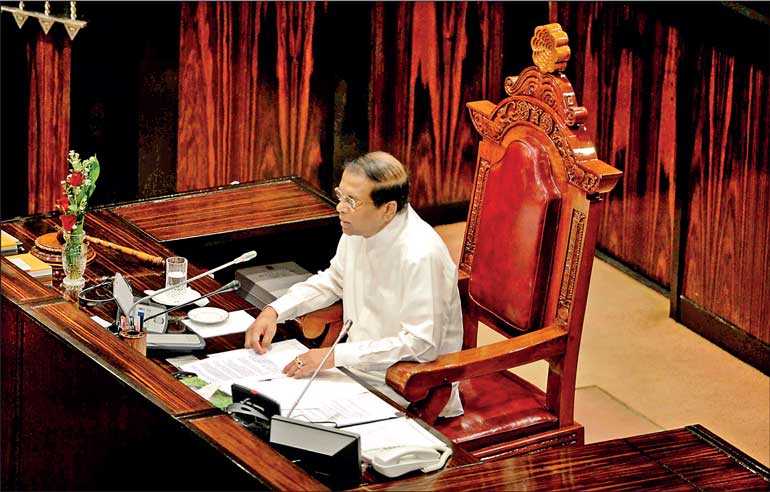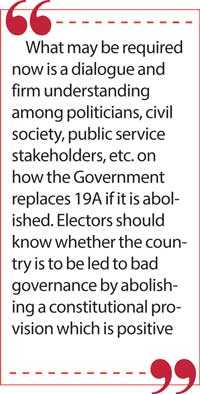Saturday Feb 14, 2026
Saturday Feb 14, 2026
Wednesday, 15 July 2020 00:00 - - {{hitsCtrl.values.hits}}

With the General Election campaign warming up, reference is made to the 19th Amendment (19A) in positive and negative forms. The positive form was highlighted recently by the civil society actors,  supporting the 19A. The negativity of the 19A is highlighted mostly by Government politicians led by the Prime Minister (PM). The demand made by the former is to refrain from giving a two-thirds lead to the Government to nastily meddle with the 19A. The latter demands a two-thirds lead to abolish the 19A.
supporting the 19A. The negativity of the 19A is highlighted mostly by Government politicians led by the Prime Minister (PM). The demand made by the former is to refrain from giving a two-thirds lead to the Government to nastily meddle with the 19A. The latter demands a two-thirds lead to abolish the 19A.
What is so wrong with 19A to abolish it? A simple answer from an anti-19A exponent is ‘because it reduced the much-required executive power, especially for the President’. A 19A supporter would say ‘because abolishing is demanded by persons who want politicisation of institutions, which is detrimental to administration and democracy’.
If the incumbent President and PM win the forthcoming General Election, certainly they will, as openly admitted, attempt to erase the 19A for several reasons. Is it because they are disinterested in depoliticising? Usually, they are interested to depoliticise when in Opposition; when in power they politicise everything. Humorously, the day when the 19A is abolished there will be parliamentarians who voted for 19A in 2015 to depoliticise, raising their hands to abolish it now, to politicise. Similarly, some raised their hands for 19A intending depolarisation, who earlier raised their hands for 18A to politicise. One common factor in both is they did and do so in the name of “strengthening the hands of the Executive”. This is sham and shameless politics in Sri Lanka!
The incumbent Government authorities must be considering 19A as allergic legislation brought against the whim and will of PM Rajapaksa’s interests when he was President. Secondly, it has become an ego rupture, especially failing to win the Presidential Election in 2015, having enacted legislation and obtaining a favourable Opinion under Article 129 of the Constitution from the Supreme Courts, enabling contest. Thirdly, they believe that constitutional provision for an Executive President to efficiently and effectively perform lies in Statutes like the 18A; and, not in the 19A type. Fourthly, they point out that the 19A created two centres of power that weakened the administration. They quote the failure of Chandrika Kumaratunga Presidency versus Ranil Wickremesinghe administration before the 19A, and President Maithripala Sirisena versus Ranil Wickremesinghe administration after enacting 19A.
Constitutionally created potential for conflicts
Knowing very intimately the political conflicts that existed during these two eras, I think the incumbent Government fearing similar conflicts cannot be justified, since the PM and President belong to one political group, share similar political thinking, strategies and after all, they are brothers. Of course, if the PM harps on enjoying the constitutional rights he has under 19A, again conflicts may be inevitable. In such a case, why should the PM canvass for abolishing 19A, other than to draw the maximum numbers, under any pretext? Anyway, constitutional provisions are not made or erased having in mind that there will be siblings steering the state machinery always! It is a much more serious business.
Anyway, it is considered that the President is an action-oriented personality, who relishes wielding power, as he did as Secretary Defence. Hence, his demanding two-thirds to abolish 19A is explainable. Simply he wants power to control affairs totally by regaining powers that were reduced through 19A. But, it will automatically mean a reduction of powers of the PM. Again a conflict of power emerges.
Where to, from 19A?
If the 19A is abolished, what could be the alternate legal provision for the new government to be more efficient and effective? It must be either reverting to the 18th Amendment (18A) at the least or, adding more power to the Executive through amendments to the 18A. The hitch I predict is whether the PM prefers to get his wings clipped or instead prefers to enjoy powers granted under 19A. Nevertheless, on stage, he is for the abolition of 19A. In Sri Lanka what politicians do, say, think, believe and dream are sometimes not straight forward!
Therefore, when we discuss the erasure of 19A we should project to the future. Since the PM or the President has not exactly stated what is in store after abolishing 19A, let us assume the easiest and closest to the PM’s chest, i.e. backslide to 18A. This is also on another assumption, that is politicians who enjoyed the 18A will not opt for anything less, but more if possible. The attempt here is to look at the effects of the abolition of 19A on good governance. Since the subject is so vast limited effects will be discussed here.
Effect on good governance
It is noted that the passage of 18A was questioned as it was passed as an Urgent Bill for which not much urgency existed with elections due years later. Additionally, now there are no ‘Urgent Bills’. The 18A was not given sufficient time for public discussion. There was criticism that the Bill encroached on  devolution under the 13th Amendment and had no green light from the Provinces, before placing on the Order Paper in the Parliament. Hilariously, when the Bill was moved in the Parliament, copies of the Bill had not been distributed among the MPs! The due process was not completed. However, let us assume the due process will be adhered to now.
devolution under the 13th Amendment and had no green light from the Provinces, before placing on the Order Paper in the Parliament. Hilariously, when the Bill was moved in the Parliament, copies of the Bill had not been distributed among the MPs! The due process was not completed. However, let us assume the due process will be adhered to now.
Good governance has several key ingredients that are safeguarded by the 19A. They are the rule of law, transparency, integrity, equal treatment, human rights, etc. Institutions have been created accordingly. The Constitutional Council (CC) established under the 19A recommends members to these institutions. In fairness to the CC, I must say that the CC has even rejected nominees for judicial appointments to the Supreme Court and Court of Appeal nominated by the former President. It proved the independence of the19A’s CC. Whether the alternative arrangements post-19A could perform so independently is an issue to ponder. However, if 18A is the alternative, it is reminded that the President can overrule the Parliamentary Council (PC) recommendations, dissolving good governance.
Another is the 19A prohibition that has made the incumbent President, while possessing the power to declare war and peace and appoint the three Services Chiefs, being disabled to be the Minister of Defence. Right now there is no Minister of Defence in Sri Lanka. The hilarity is that he is unquestionably the professionally best suited to be the Minister of Defence from among the Ministers in the Cabinet. But, as he not being a parliamentarian prohibits such an appointment. In fairness to the President, irrespective of individuals, such misnomers in the 19A can be revisited.
Similarly, there are provisions in the 19A that have withstood Presidential dictates successfully. They are now time-tested. The Supreme Court has already determined the legal status of these. I quote the ruling on the former President’s Opinion on the duration of office, removing the former PM from office and appointing the incumbent PM as PM in October 2018. However, the internationally recognised democratic governance tool of “floor testing” was indirectly challenged by such latter action and it also could be displaced, if 19A is abolished. Maybe such a reduction of power must be irking the Government ranks.
Effect on presidential powers
Firstly, we may consider how the presidency gets affected, as the essence of 18A then was to accord supreme power and authority to the President. It appears that the same is the priority even today. Some political commentators believe that a powerful executive presidency is required to liberate the country completely from international manipulations, foreign-based terror groups, ISIS activism operative in the region, and the fast-tracking of the lagged socio-economic development efforts. All these affect public services.
There is another school of thought that personifies the incumbent President as the Messiah who had proven prowess to accelerate action and therefore demanding extreme necessity to “strengthen his hands” by giving more power to him to bring in political stability and economic revival. There were similar catchwords when President Mahinda Rajapaksa was President. Parliament wanted to give him more power than what was given by the 1978 Constitution, e.g. abolishing the two-term presidency. The 18A was the result.
The 18A abolished the two-term presidency permitting anyone to be elected as the president for any number of times. This is considered unusual in democracies but mostly observed in autocracies, with tyrannical rule. Some countries have even created the concept of ‘President for Life’. Those who oppose such believe that such extension paves the way for the death knell of democracy and good governance, and lead the country to a totalitarian State. The complaint made of “militarisation” rightly or wrongly fertilises such belief.
The Constitution was further amended with provision for the president ‘shall by virtue of office’ attend Parliament once in every three months. He was entitled to all the privileges, immunities, and powers of a Member of Parliament, other than the entitlement to vote, and shall not be liable for any breach of the privileges of Parliament or its members. What was subtly done by such attendance was to enhance the power of the president, while providing an opportunity to the executive president to hinder or indirectly influence the freedom of the parliamentarians who had a different mandate to be representatives elected by the people.
One may even argue that this affected the doctrine of the Separation of Powers, though his presence in the Parliament could bring in better discipline and efficiency in a way. The Parliament might lose its sovereignty and autonomy due to the control that can be exercised by an all-powerful president.
If looked at manifestos of presidential candidates the two-term limit violates the promise made by Presidents Chandrika Kumaratunga, Mahinda Rajapaksa, and Maithripala Sirisena. The mandate received by all of them was to abolish the Executive Presidency. Now the erasure of the two-term stipulation by abolishing 19A is to perpetuate Executive Presidency if 18A is the alternative. Mahinda Chinthana and Yahapalanaya wanted power to be shifted to the Parliament. This was tried upon to an extent by the 19A and reverting to 18A may affect strengthening the Parliament.
Constitutional Council vs. Parliamentary Council (PC)
According to the 19A, a CC was established. It comprised politicians starting from the speaker, PM, leader of the opposition, and representative parliamentarians, and professional, apolitical community representatives. The 18A established a PC. It consisted of the speaker, PM, leader of the opposition, and two parliamentarians separately nominated by the PM and the leader of the opposition—all parliamentarians.
Under 18A appointments, if the president belonged to the party in power in the Parliament he will be able to exercise control and influence over the PM, speaker, parliamentarians of his party, and appointed by him and hence there will be steamrolling of issues raised in the PC, to his benefit. The Council will always rubberstamp any proposition by the president. This is not what is expected of a CC. Under 19A, as quoted earlier, the CC rejected the president’s propositions on arguable and reasonable grounds. Probably those supporting abolishing 19A do not want such independence from a CC.
However, in a recent ‘Sirasa’ television interview, former President Maithripala Sirisena stated that the Independent Commissions (in 19A) should remain, but the hold the Speaker has in ‘administering’ them should cease. Does this sentiment show half-heartedness even within the Government ranks on this subject? Or, is follow-up action still unplanned? Or, will President Sirisena be steamrolled when the final decision on 19A is taken?
In fairness to President Sirisena’s term in office, there were a few instances that could be quoted as challengeable recommendations of the CC, where compromise had to be made. These could have been teething problems. With ageing, the institutions will mature in attitudes and operations. Anyway, recommendations by 18A could be overruled by the Executive and hence the PC becomes toothless, in comparison to CC of 19A.
Appointments to institutions
Under the 19A some institutions were established. They are the Election Commission, Public Service Commission, National Police Commission, Audit Service Commission, Human Rights Commission, Commission to Investigate Allegations of Bribery or Corruption, Finance Commission, Delimitation Commission, and the National Procurement Commission. Origins of some of these were in other legislation.
According to the 19A, members of these institutions are appointed by the president on the recommendation by the CC. There had been a few disagreements between the CC and the executive, which were sorted out by negotiation. If the CC and the executive both are hard-headed these disagreements may create functional problems.
This process applied also to the appointments of the chief justice and the judges of the Supreme Court, president and the judges of the Court of Appeal, members of the Judicial Service Commission other than the chairman, attorney-general, auditor-general, inspector general of police, parliamentary commissioner for administration (ombudsman) and the secretary-general of Parliament. Here too there were a few issues raised but sorted out by negotiation.
According to 18a when appointments are to be made by the president, the president requires the observations of the PC. When he calls for the observations, and if the observations do not reach him through the Speaker within a week, the appointments can be made without observations. The PC had the power to make observations that can be overruled and one cannot expect explanations from the president either. Therefore, if the PC is the replacement of the 19A’s CC, bringing back good governance may be difficult.
Public Service Commission (PSC)
For want of space, we may consider the implication of such action by the president considering the PSC that is appointed by the president on the recommendation of the Constitutional Council under 19A. According to the 18A, the PSC was appointed by the president at his sole discretion. The PC had no say to make recommendations on members of the PSC. This will weaken the free and independent functioning of the PSC or for that matter any other Commission or any appointee.
It should not be misconstrued that appointments made under 18A previously were always faulty. The possibility of losing independence and fair play is what is meant as an issue. So much so, rightly or wrongly, there are current commentaries by opposition politicians that if not for the independence enjoyed by the Election Commission under 19A, the General Election would have been held on 25 April, 2020 on Government instigation, irrespective of the COVID-19 pandemic. We may have to consider these extremely politically sensitive situations when administering the Constitution.
The PSCs have a history of been politicised from the post-Independence Constitution. The 1972 Republican Constitution politicised the PSC by taking charge of appointments of Heads of Departments through the Cabinet of Ministers. The 1978 J.R. Jayewardene Constitution also endorsed it. In 1998 a Committee appointed by Karu Jayasuriya recommended changes. But as a stalwart in the United National Party Alliance Government in 2001 and later as the Speaker presiding over the passage of the 19A, this wrong approach was not corrected. It appears the political hierarchies love to keep the PSC and the Police Commission under their thumbs, irrespective of differing political ideologies. In this background reverting to 18A will be pushing the public service into a worse predicament.
Conclusion
The effects of the abolition of the 19A are much larger to be discussed in a short article. It reasons why only a few areas are considered here. The implementation of the 19A has shown the need to amend some provisions. Such a proposition may be questioned by good governance exponents as regressive, but constitutional provisions must be practical and operable. With some experiences of the CC, even systemic changes of the CC may arise and hence the 19A may have to be revisited in that light, even by the CC.
Taking the above situations into consideration what may be required now is a dialogue and firm understanding among politicians, civil society, public service stakeholders, etc. on how the Government replaces 19A if it is abolished. Electors should know whether the country is to be led to bad governance by abolishing a constitutional provision which is positive.
Government spokespersons have been mentioning constitutional reforms. The discussions that were held by the Sub Committees of the Steering Committees on Constitutional Reforms under the previous Government may be useful guidance in such exercise. No one is aware whether it is reform by revisions, amendments, or a brand new constitution that may even abolish the 13th Amendment, 19A, and several other areas. We find these are shrouded in secrecy. The processes should be transparent, which in itself is an ingredient of good governance.